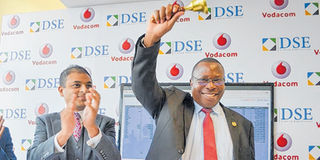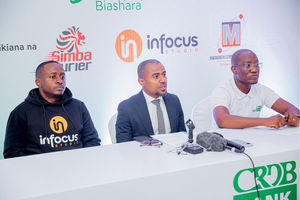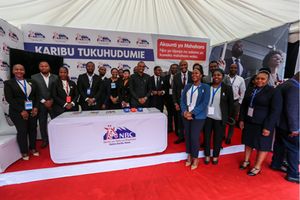Why regulator rejected telcos’ IPO applications

Finance minister Philip Mpango and Vodacom Tanzania managing director Ian Ferrao during the listing of Vodacom shares on the Dar es Salaam Stock Exchange (DSE) last month. Vodacom is the first and so far only telecommunications company to have been listed on the DSE. PHOTO | FILE
What you need to know:
Six telecoms and one communication company submitted their applications to the CMSA for review, before being approved to float their initial public offering (IPO) shares, but none managed to get the nod.
Dar es Salaam. Mobile telecoms and communication companies’ applications for floating initial shares at the Dar es Salaam Stock Exchange (DSE) have been rejected twice by the Capital Markets and Securities Authority (CMSA), The Citizen has established.
Six telecoms and one communication company submitted their applications to the CMSA for review, before being approved to float their initial public offering (IPO) shares, but none managed to get the nod.
The companies whose applications were rejected by the regulator twice Are Tigo, Airtel, Halotel, Maxcom Africa Limited, TTCL and Smart.
There are 82 other companies which have yet to submit their applications.
The CMSA communication manager, Mr Charles Shirima, confirmed to The Citizen that applications from all six companies were not approved and that the firms were notified of the need to improve them to meet requirements.
“We have so far returned all six applications because they were lacking some requirements in accordance with the capital markets listing regulations. No one is complete yet,” he said during an interview with The Citizen on Friday.
“The aforementioned companies submitted their applications for the first time, but we told them to go back and improve them. They came for the second time; we reviewed them and still found out that they were not in compliance with the law.”
Mr Shirima said the review involved all aspects in the company’s prospectus and that they found out that all of did not meet the standards.
Generally, it has been revealed that most of the rejected applications were turned back because of shareholding disputes, lack of transparency, failure to provide full information as well as regulatory technicalities.
Explaining on what caused Tigo application to fail, Mr Shirima said it was down to a pending shareholding case whose ruling has yet to be made.
The court battle involves Golden Globe, which claims that it owns 99 per cent of the company shares, but it was not involved in preparing the company’s prospectus.
At Airtel Tanzania, the Director of Communications, Ms Beatrice Singano, did not specify the reason why the company application was turned away twice by CMSA.
“As you are aware that the government is among the company’s shareholders, so I can’t tell you because it may be the problem of the shareholders,” she said via telephone on Friday.
She later asked The Citizen to e-mail all queries, but until press time, Airtel Tanzania director had not given an update over the listing progress.
In February this year, Airtel shareholders including Indian Bhati Airtel (60 pc) and Government of Tanzania (40 pc) did not agree on how many shares each side should offload to the public through the initial offer.
Earlier report showed that the company expected to raise about Sh25 billion through planned IPO as the company Net Asset value stood at Sh100 billion.
However, it was first agreed that each shareholder should allocate 12.5 per cent of its shares for the IPO.
When contacted yesterday to give the details about the listing progress, the deputy managing director of Halotel Tanzania, Mr Le Van Dai, said he was away, but he offered the phone number of a responsible person.
However, he confirmed that his company submitted an application to the capital markets authority one month ago, although he fell short of stating why it was rejected.
For her part, an official who was mentioned by the company deputy chief as key person in listing said she could not provide any information because it was confidential.
Efforts to get the TTCL managing director, Mr Waziri Kindamba, failed because he did not pick up calls. Even when texted, Mr Kindamba also did not respond.
Up to now, only Vodacom Tanzania Plc has listed their 25 per cent of shares at the bourse after a successful IPO as required by the Electronic Postal and Communication Act 2010.
Vodacom Tanzania, which has the largest market share of mobile telecommunication, managed to raise Sh476 billion from selling 560 million shares by hooking up 40,000 local individual investors.
According to Epoca, all telecoms and communication companies were required to float their IPO before December last year. There are more than 80 companies, which are required to sell a quarter of their shares to Tanzanians and foreigners.
Earlier, non-Tanzanians were not allowed to buy initial shares, but low liquidity and low subscription experienced during the Vodacom Tanzania IPO, forced the CMSA to open the door for foreign investors.
Although Mr Shirima did not mention the value of all six prospectuses, analysts believe that they might be close to Sh1 trillion, five per cent of the current DSE market capitalisation.
“It is too early to give the value of all shares from six companies because they might go down after completion of evaluation processes,” Mr Shirima noted. The government has already said telecoms and communication companies, which will fail to list 25 per cent shares at the Dar es Salaam bourse, their licenses will be revoked. Earlier this year, the Tanzania Communication Regulatory Authority (TCRA) director general, Mr James Kilaba, was quoted by The Citizen saying that firms that failed to meet the December 2016 deadline would depend on the CMSA’s verdict.




